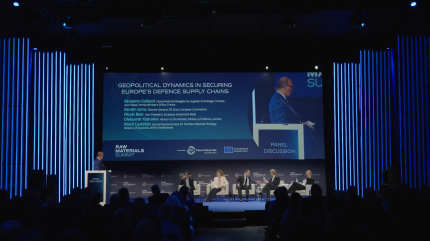
European security and defence were high on the agenda at the EIT RawMaterials Summit, held in Brussels from 13 to 15 May.
With escalating geopolitical tensions surrounding Europe and within the continent itself from the ongoing Russia-Ukraine war, securing critical raw materials (CRMs) for defence applications is more important than ever.

Discover B2B Marketing That Performs
Combine business intelligence and editorial excellence to reach engaged professionals across 36 leading media platforms.
However, the consensus is that Europe is lagging far behind. Allard Castelein, special representative for raw materials strategy at Netherlands’ Ministry of Economic Affairs, stated: “A deep concern I have is whether there is a full appreciation of the urgency and what it takes to move from A to B.” He was speaking during a panel entitled Geopolitical Dynamics in Securing Europe’s Defence Supply Chains on 14 May.
Castelein asserted that the 2030 targets of the European Critical Raw Materials Act (CRMA) are “out of reach”. These aim to ensure that 10% of the EU’s annual demand is met through domestic extraction, 40% through domestic processing and 25% through recycling within the EU, as well as limiting dependency on a single third country for any individual CRM to no more than 65%.
The CRMA lists 34 materials, of which 17 are considered ‘strategic’: bauxite, bismuth, boron, cobalt, copper, gallium, germanium, rare earth elements for permanent magnets, lithium, magnesium, manganese, graphite, nickel, platinum group metals, silicon, titanium and tungsten.
The panellists spotlighted the importance of graphite in aircraft, submarines, tanks and missiles, for which Europe is heavily dependent on China. Of the CRMA’s 47 strategic projects, 11 cover graphite extraction, recycling, substitution and processing.

US Tariffs are shifting - will you react or anticipate?
Don’t let policy changes catch you off guard. Stay proactive with real-time data and expert analysis.
By GlobalDataInstitutions like the European Investment Bank (EIB) have a role to play in financing, as EIB vice-president Nicola Beer explained. “The bank is already engaged with about 60% of the strategic projects under the CRMA. Part of the complex challenge is working on specific challenges of every raw material separately, with a special emphasis on defence.”
Emanuel Proença, CEO of Savannah Resources, told Mining Technology: “Europe absolutely needs a footing in CRMs and defence is a key opportunity.”
Savannah is developing the Barroso lithium project in Portugal, which has been designated as a strategic project under the CRMA. The company is currently working towards completing the definitive feasibility study and submitting it for the final, confirmatory phase of the environmental licence by the end of 2025.
Stockpiling strategic materials: a European issue
Efforts by industry and regulators aim to address the “fragmentation in the EU’s defence industrial base”, as outlined by last year’s Draghi report on EU competitiveness. As the CRMA includes a soft request for national stockpiles, the report recommends a definition of mandatory EU-wide stockpiles to “provide some certainty of supply”.
The quantities of strategic materials needed for defence are small, confirmed Benjamin Gallezot, Interministerial Delegate for Supplies of Strategic Minerals and Metals at the French Prime Minister’s Office, as he emphasised the importance of stockpiling.
“In 2023, the French Government adopted a specific legal framework which makes stockpiling mandatory for companies that are active in defence and for all production activities to be redirected to defence in times of emergency,” he stated. “You cannot take a chance on defence, and stockpiling is a no-brainer.”
In agreement was Joaquim Nunes de Almeida, director of DG Grow, which works to develop and implement EU policies that support businesses. “We are talking about small quantities and projects that will be uncommercial forever. The state and public sector has to be able to subsidise these as we calculate what the remilitarisation of Europe means in terms of CRMs.”
Gallezot confirmed that France is supplying the Netherlands with CRMs. “Stockpiling is a European matter, not just a national question, but within member states, commercial stockpiles also help in a crisis to increase defence applications.”
The CRMA requires large EU companies to become aware of strategic material supply risks and create appropriate mitigation strategies to be better prepared in case of supply disruptions. For defence-related manufacturing, this includes robotics, drones, rocket launchers, satellites and advanced chips.
Looking ahead to secure European defence
Joining the other panellists was Oleksandr Kubrakov, adviser to Ukraine’s Ministry of Defence, who explained the country’s tough position. “In recent decades, the Ukrainian mining industry has been focused on short-term projects as there was no political stability for longer-term foreign investments,” Kubrakov said.
While calling for NATO membership, Kubrakov added that as Ukraine is currently in an accession process to join the EU, “it is time to act again. European companies could participate in projects at feasibility stages right now.”
Going forwards, Krzysztof Galos, Undersecretary of State in Poland’s Ministry of Climate and Environment, asserted that Europe’s CRM list must be continually updated to meet the evolving needs of the defence sector.
The list is reviewed and updated by the European Commission every three years, allowing for additional reviews upon request from the European Critical Raw Materials Board, based on monitoring and stress testing.
“There is no use having a defence industry without having resilient industrial activity. The two must be brought together,” concluded Castelein.





